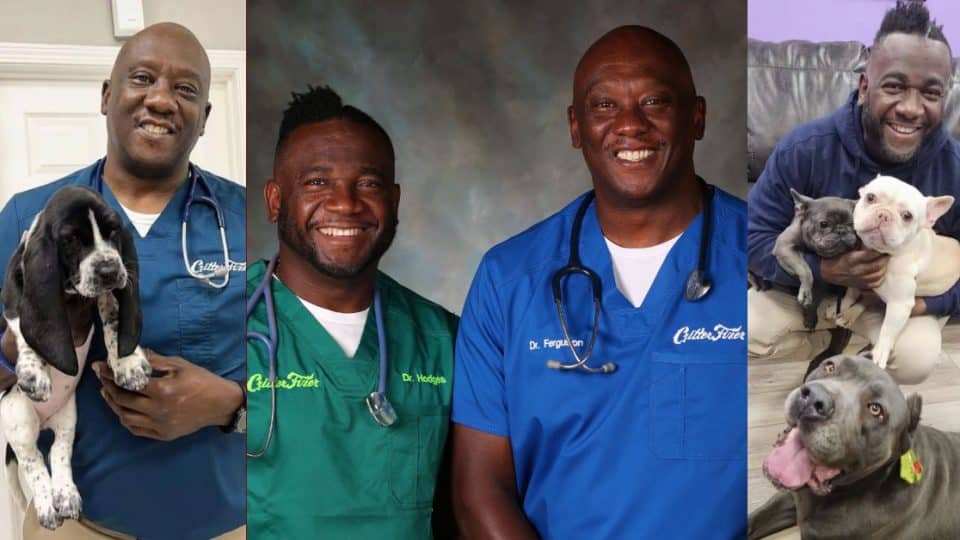- Not a substitute for professional veterinary help.
Dr. Terrence Ferguson—the beloved veterinarian and one of the stars of the National Geographic Wild show “Critter Fixers: Country Vets”—dreamed of becoming a vet when he was just seven years old. But there were numerous barriers along the way.
As a kid, he wanted to watch a vet in action and learn about what it was like. “I was going to different veterinary clinics at that time, wanting to shadow, just wanting somebody to take me under their wing,” he tells The Dog People.
Unfortunately, he kept hearing the word “No.” He eventually became so discouraged that he wasn’t sure if he could become a veterinarian. Then a chance encounter changed everything.
“It wasn’t until I was a junior in college that I actually saw the first Black veterinarian,” he says. “When I saw this person that was Black, looked like me, that was doing a profession that I’d wanted to do since I was seven years old, that reinvigorated me.”
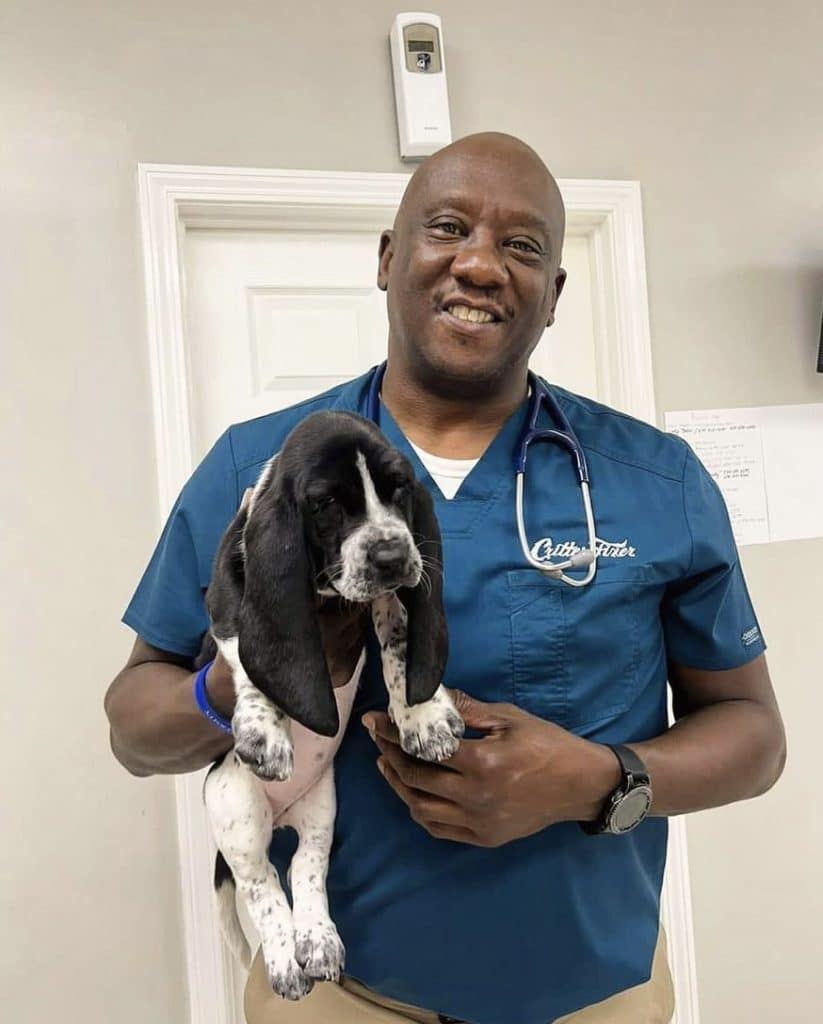
Dr. Terrence Ferguson never saw a Black veterinarian until he was a junior in college. That’s one reason why he feels representation is so important for the next generation of veterinarians. Photo courtesy of Critter Fixers
A Passion Ignited
Ferguson went on to graduate as a Doctor of Veterinary Medicine (DVM) from the renowned Tuskegee University College of Veterinary Medicine and open Critter Fixer Veterinary Hospital in Bonaire, Georgia, with fellow Tuskegee grad Vernard L. Hodges, DVM, in 1999.
Their hard work has paid off: The two vets have gone from being the sole two employees at their small practice—Dr. Hodges quips to The Dog People that Ferguson “was my underpaid receptionist and I was just the underpaid kennel guy cleaning the kennels”—to having two animal hospitals with over 50 employees.
“Critter Fixers: Country Vets” first aired in 2020 and showcases the veterinarians’ skill with a remarkable variety of species—as well as their trademark humor and compassion. (Look for the fifth season this April on Nat Geo Wild and streaming on Disney +.)
As long as you have a dream and you persevere, you can become whatever you want to be in life.
As Black men working in a field in which roughly 90 percent of U.S. veterinarians identify as white—and just 2 percent as Black—both doctors feel strongly about the importance of representation and mentorship.
To that end, Dr. Ferguson co-authored a children’s book, “C Is for Critter Fixer,” he would have loved as a kid. The book is loosely based on his own childhood experiences.
“I wrote that book to inspire kids that it doesn’t matter what you look like. As long as you have a dream and you persevere, you can become whatever you want to be in life,” he says.
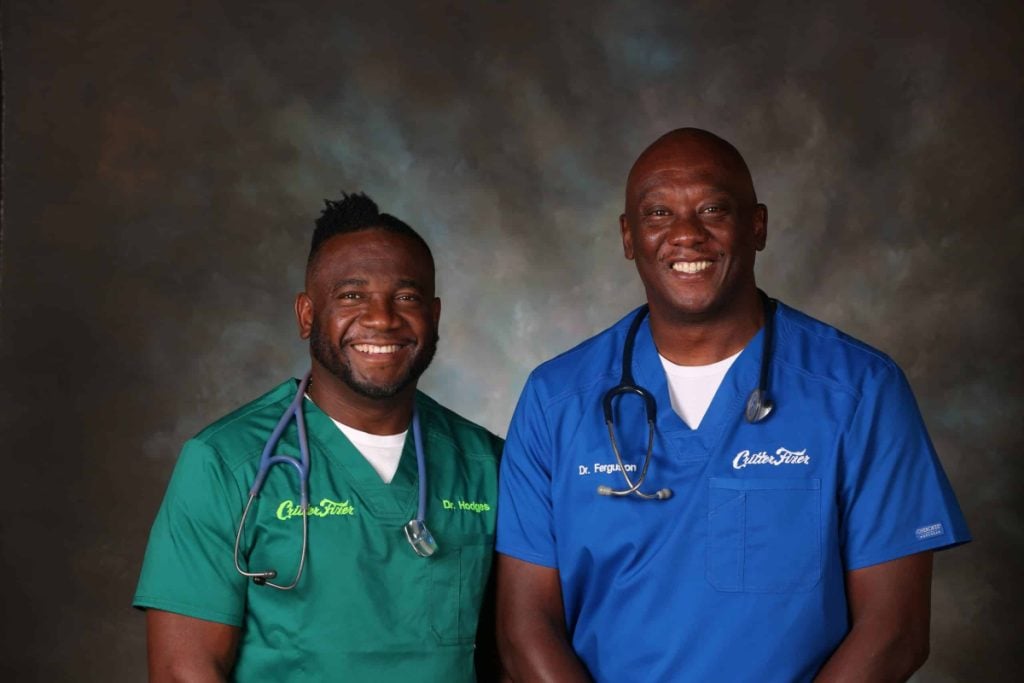
Drs. Vernard L. Hodges (left) and Terrence Ferguson of Nat Geo Wild’s “Critter Fixers: Country Vets.” Photo courtesy of Critter Fixers
Kindling the Dream
Last year, the Critter Fixers launched a free program called “Vet for a Day” to inspire kids to consider a career in veterinary medicine. Their first event drew 65 children from four states to their practice to watch the veterinarians in action.
“It’s definitely a good experience for them because they actually get to see what we do as veterinarians,” explains Dr. Ferguson. “We do surgery, they get to see endoscopy, how to restrain animals, how to do X-rays, how to do ultrasounds—different things that we do in the veterinary clinic.”
The kids get a first-hand look at a day in the life of a veterinarian, as well as education for both themselves and their parents about how to become one.
“The kids can want to be a veterinarian, but if the parents don’t really know what resources are available or how to help their kids pursue this profession, then it doesn’t help,” he adds. “So we’re doing both ends of the spectrum, and we are hoping that we can try and increase the diversity we have in veterinary medicine.”
After the success of the first Vet for a Day event, the Critter Fixers expanded to hold additional events that reached 1,200 young people. In 2023, the vets are planning a tour of cities across the U.S. to reach over 2,000 kids.
“The Critter Fixers will be there. We are going to be at every stop, and we are there to encourage the next generation of veterinarians,” Dr. Hodges shares. “It’s all 100 percent free. We give them stethoscopes, we give them bookbags, and we even have a few scholarships for kids who want to come. We want to eliminate as many barriers as we can for kids to become veterinarians.”
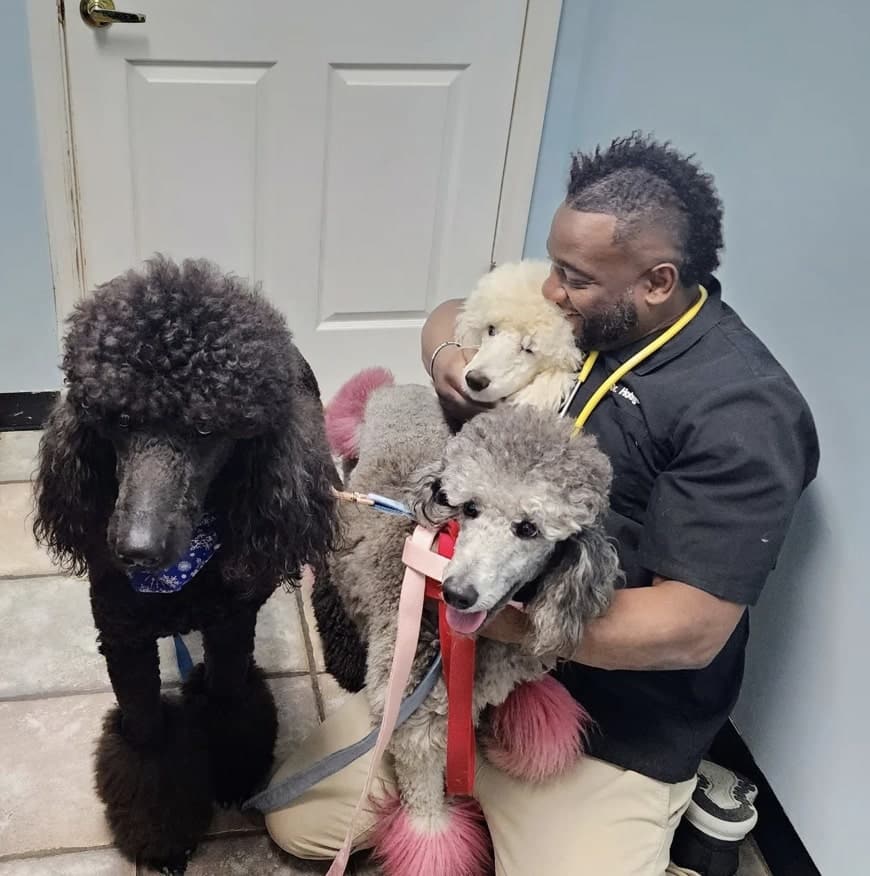
Critter Fixers vet Dr. Vernard Hodges with some of his patients. Photo courtesy of Critter Fixers
Representation Matters
They also spark interest just by being themselves on “Critter Fixers: Country Vets.” Dr. Hodges loves cracking jokes with his friend while filming “like the old days” when they were just starting out. The comments from fans are also incredibly meaningful to both men.
Just the representation that we bring is what I love.
“I think for me, the best thing is we talk about ‘Representation matters,’” says Dr. Ferguson. And when I hear people come up and say, ‘I like what you guys are doing. You’re doing veterinary medicine right,’ or, ‘I’ve never seen a Black veterinarian,’ or, ‘My kid wants to be one—just seeing you inspires them to want to become a veterinarian’…just the representation that we bring is what I love.”
Tackling the Pet Obesity Epidemic
Of course, they also love helping so many animals. In a single episode they might microchip peacocks, operate on a fox’s tail, trim a limping pig’s hooves, treat (and find a home for) a blind kitten, and care for a sick litter of puppies.
So it’s safe to say they’ve pretty much seen it all. But one common issue that concerns them both is a rise in pet obesity during the pandemic—and the fact that owners often don’t realize their animal needs to lose weight for sake of their health.
“Especially down in the South, we all carry a little something,” Dr. Hodges says with a smile. “People come in the exam room and instantly, you’re looking at this dog like, ‘This dog definitely is overweight.’ And people are like, ‘Man, he’s so cute and cuddly.’ And they are cute and cuddly, but a lot of times, most parents don’t realize they’re overweight.”
Extra pounds can shorten a dog’s life. Dogs with a healthy body weight live up to 2 ½ years longer than overweight dogs.
The 2018 retrospective study “Association between life span and body condition in neutered client-owned dogs” found that dogs with a healthy body weight live up to 2 ½ years longer than overweight dogs. Pet obesity can lead to health issues like diabetes, arthritis, kidney problems, and heart disease—not to mention general sluggishness.
So extra pounds can shorten a dog’s life—and make their day-to-day lives more challenging. For instance, Dr. Hodges once treated a police dog whose handler was concerned that he’d stopped performing at work.
When Dr. Hodges laid eyes on the dog, he realized the dog moved like he had arthritis because he’d gained about 10 pounds since his last visit. So he worked with the handler to develop a new diet that involved less food—and instituted weekly weight checks.
“Fortunately, this dog lost the weight and is performing and doing his job as a canine police officer,” he says.
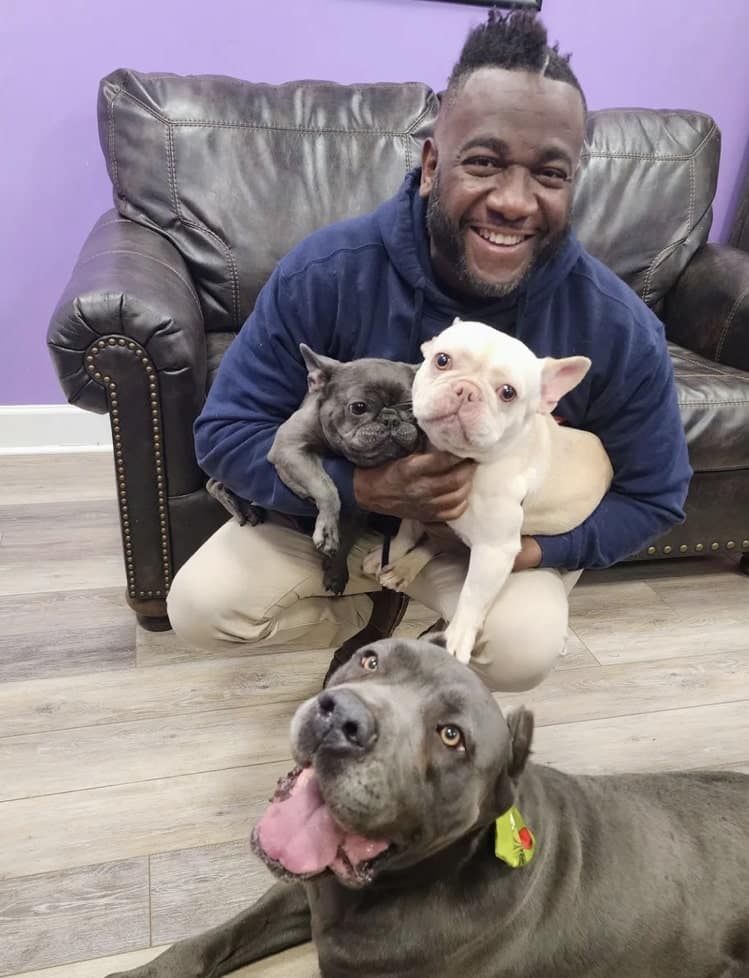
Dr. Hodges (pictured) and his fellow “Critter Fixers” star Dr. Terrence Ferguson are using their platform to spread the word about the health implications of pet obesity with the Hill’s 2023 Annual End Pet Obesity Campaign. Photo courtesy of Critter Fixers
Food as Medicine
Dr. Ferguson, who enjoys performing orthopedic surgery, became passionate about curbing pet obesity after receiving a call about a limping dog whose knee he’d repaired several years before. An examination found the knee was fine, but the dog had gained 10 pounds since the operation. The extra weight had proved too much for the surgically repaired knee.
Dr. Ferguson worked with the dog’s family to create a weight loss plan, which they followed. When the dog lost weight, the lameness and limping went away.
“It doesn’t take a lot of weight, especially on these dogs that we have to do orthopedic procedures on – two-, three-, or four-pounds overweight, and they can become lame. There’s nothing wrong with the procedure, it’s just they’re carrying a little bit more weight,” Dr. Ferguson told The Dog People. “So what I’ve done since then is I’m automatically putting these dogs on a weight management diet so that we can eliminate getting into that problem.”
While it can be hard to resist “puppy dog eyes,” it’s important to remember that it can be easier to manage our pets’ weight than our own.
“One thing we talk about is loving your pet to death: too many treats or the wrong foods are very common,” cautions Dr. Hodges. “Can this dog open the refrigerator, or can they open the cupboard? Listen: You can control that.”
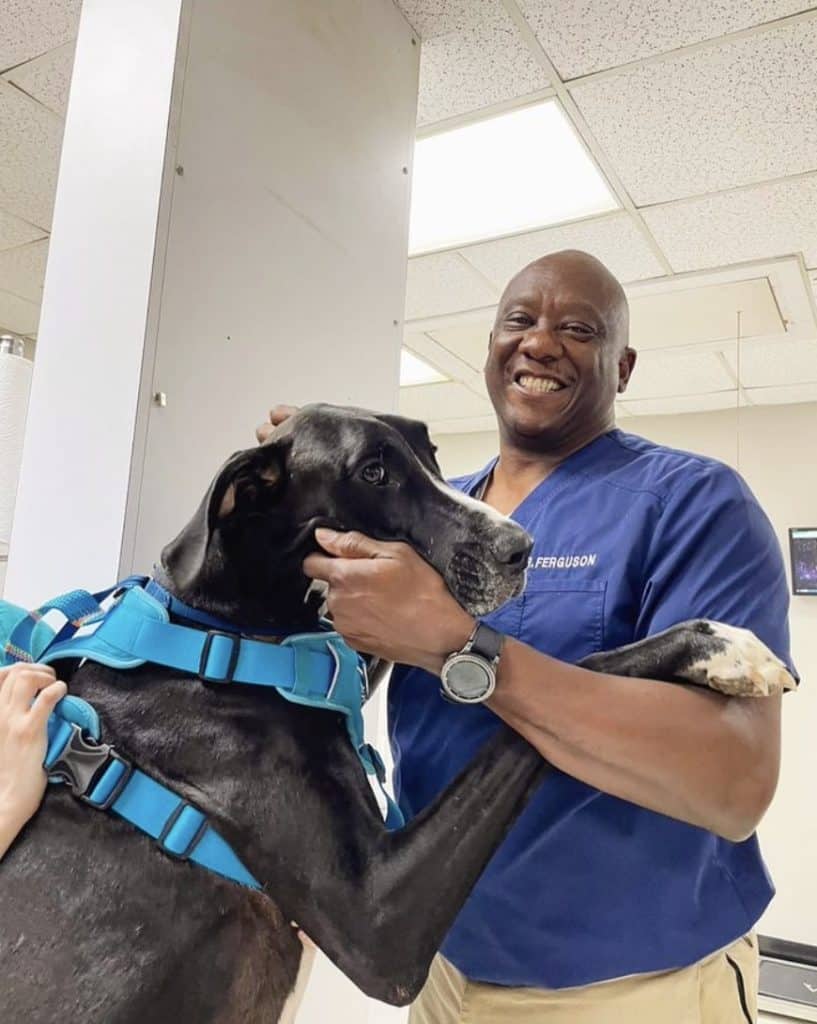
Dr. Terrence Ferguson smiles with a Great Dane. Photo courtesy of Critter Fixers
“We’ve Been Very Blessed”
Spreading the word about pet obesity is just one of many ways the friends and business partners give back. The two vets recently hosted a free veterinary clinic for pets of people experiencing homelessness at a community center in Macon, Georgia, through the national nonprofit The Street Dog Coalition.
It was such a success that they’ll host another free clinic later this month in conjunction with a veterinary school to help students gain experience while helping others.
“We’ve been very blessed, so why not help out our community?” Dr. Hodges says.
Watch Nat Geo Wild’s “Critter Fixers: Country Vets” online at: www.nationalgeographic.com/tv/shows/critter-fixers-country-vets
For more information about the free Critter Fixers’ Vet for a Day program, visit: www.cfvetforaday.com
For more about the Hill’s 2023 End Pet Obesity Campaign, visit: www.hillspet.com/products/weight-management-pet-food
